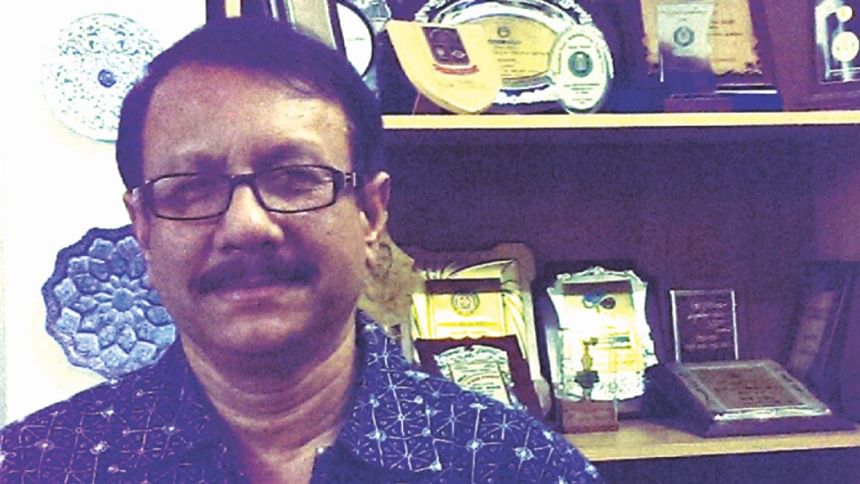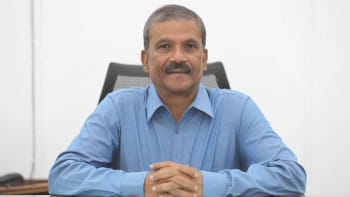Rendezvous with Poet Kamal Chowdhury

Kamal Chowdhury enjoys a special place in contemporary Bengali poetry. His style is exclusive. Apart from taking up diverse issues as subjects of his poems, he treats them in a manner which is both idyllic and nightmarish. From the soaring ideals and darker sides surrounding the 1971 liberation war to the brutal killing of Bangabandhu Sheikh Mujibur Rahman - Chowdhury has sketched a Bangladesh at once marked by fluidity and multiplicity. The poet has published more than fourteen volumes of poetry; Michhiler Shoman Boyoshi (As Old as the Procession), Panthoshalar Ghora (Horse of the Caravansary), Mukti o Shadinotar Kobita (Poems of Liberty and Freedom), The Story of Bones and Other Poems are a few of his widely popular books. He has received several prizes including the prestigious Bangla Academy Award and Jibanananda Award for his contribution to literature.
I met the poet one evening to discuss his notions of literature, especially poetry. Our conversation revolved around Chowdhury's ideas of poetic creativity and process as well as his childhood in the countryside. Here is an excerpt from the rendezvous.
As a poet who has been writing for more than four decades, addressing diverse socio-political issues, you're known to have experimented with poetry in all its forms. How do you define Poetry?
It is very difficult to define poetry. Poetry is not theory, nor is it philosophy. Poets in different ages have, however, tried to define it. For me, poetry is the mix of imagination and endless possibilities. Poetry is forever new, for the poets react to their times and societies afresh and make it anew. Our affliction, love, hatred, desire - all get their due place in poetry. It is an outburst that comes out of a ruthlessness that cloaks us. Joy, desire and the despair we experience in our everyday life cause an emotional outburst. This is what gives a poet the bliss of a successful creation. My search for poetry is on and the destination remains unknown to me.

Wordsworth defined poetry as a spontaneous overflow of powerful emotion, the emotion which is recollected in tranquility. How does poetry come into being? How do you write poems?
There is actually no step-by-step formula to write poetry; it is far from being mechanical. Mastery over language and emotional exuberance are important; nevertheless, I don't think one can write poetry even when one has this command of language and experienced the excitement. The words only provide the skeleton, the rest of the ingredients are indeed mysterious; they come and go according to their own will. They cannot be controlled, measured and arranged into a proper work of art. The blood stream of poetry - the sorrow, desperation, hunger, corporal urge, nationalist zeal - accumulated through past experiences and the hope for a bright future inspires the poet. Inspiration is highly impulsive and no one knows when it will hit the poet. It might strike like a thunderbolt or it might take its time to visit the poet. I am yet to find out the way of composing poems; I just hover around and try to find it in everything. I hope someday before death, like Yeats, I will come to know how to write poems.
Much has been said about subjectivity in poetry. The 'I' in a poem may or may not be the poet. The biographical approach to literature holds that the poet's own life and circumstances can provide a window into his/her poems which, however, is opposed by the formalists. Do you think your own self is present in your poetry?
Poetry is autonomous and it should not be confused with the poet's own life. I don't think I plan to exist in my poems. The readers should not look for me or my own story in my work; they should read it for the sake of reading and understanding it. However, I am a human being and I live in a particular time and society. And certainly I cannot remain detached or isolated from the things that happen around me every now and then. It is quite likely that traces of my own being have found their way into my poems occasionally.
How did your journey as a poet begin? Do you remember the first time you penned a poem?
I don't distinctly remember when poetry first took over me. Actually I thought I'd be a writer and tried my hand at prose. As far as I can recall, I wrote my first poem for a school magazine. At college I took it quite seriously and it took momentum at university where I met other poetry-lovers like me. We became good friends soon enough and passed many sleepless nights discussing poetry. I have been living with poetry since then.
What inspired you to write poems?
Frankly speaking, the answer is: I do not know. No one actually told me how to compose lines or where to look for inspirations. I was born into a typical middle-class family; no one from my family ever tried poetry. Nonetheless, my mother told me that my grandfather used to write letters to my grandmother in verse! My father used to read me from Persian classics - Ferdausi, Khayyam, Rumi, the usual lot. Something might have come down to me from there.
Who have inspired you from Bengali literature? Tagore and Nazrul seem to occupy an important place in your work.
Of course Tagore and Nazrul have a profound impact on me as they have on any other Bengali poets. I first encountered them in school because our academic courses contained their poems. Back then I had little familiarity with Jibanananda Das, Buddhadev Bose, Sudhindranath Dutta, Al Mahmud, Shamsur Rahman, Shahid Qadri. Later on they became my favourites. During my youth I was more inclined towards adventure stories - Nihar Ranjan Gupta and the like. I was a member of a club called "Bijoykora Sabuj Sangha". I used to borrow books by great writers, including Manik Bandopadhyay, Bibhutibhushan Bandopadhyay, Tarasankar Bandopadhyay, Bimal Mitra .
You mentioned you started with prose and then moved on to poetry. Can you elaborate?
Yes, I wrote prose first. I wrote a detective story while attending an elementary school. I was very young, and as I said before, I was very much into adventure stories as well as Bengali fables then. I even read the Bengali translation of John Steinbeck's Moon is Down at that time. It is not unlikely that these works influenced me in my early age.
How is a poet born? His early experiences propel him, or. . .?
Maybe, but I am not completely sure. I spent my early days in my native village and naturally it had been an enriching experience. The endless trails, the darkness of the nights, the fireflies, the chirp of the crickets, climbing the date palms to collect the nectar, sitting beside the fire while mother cooked winter delicacies, watching midnight performances by travelling theatre troops - everything had its unique hold on me. They might have had the same impact on my poetry too.
The liberation war features in many of your poems. Why is it so important to you as a poet?
For me, the liberation war symbolizes all that is beautiful and lofty. Our victory in the 1971 war of independence is the greatest achievement for our nation and its influence is intense. I grew up seeing the struggle of common people for a separate nation which they could call their own and on which they could build their identity; the impact it left upon me was overwhelming. However, the discrepancy between what we thought and what we actually achieved is frustrating. The broken dream and the wrecked magic spell haunt me all the time. Our ideals were high but we forgot the heroes of 1971- people who lost their lives or those who lost their limbs and remained physically challenged for the rest of their lives; or the protagonists of the 1952 language movement - the university students who laid down their lives to ensure the dignity of their mother tongue. We hold nationwide celebrations to commemorate the spirit and ideal behind these movements, we are however oblivious of the essence. My poem "Roktakto Pangtimala" ("Blood-stained verses") juxtaposes my thoughts on the hypocrisies against the frustrations.
Your thoughts on Bangabandhu Sheikh Mujibur Rahman? Your poem "10 January 1972" is about the father of the nation's homecoming.
Bangabandhu is at the heart of the Bengali people. I just talked about discrepancies and hypocrisies - his brutal assassination is the biggest example of how we forget our essence. I was one among the jubilant millions who witnessed the homecoming of the greatest son of Bengal on January 10, 1972. And certainly I was overwhelmed by his return to Bangladesh; it was like getting back a father, a friend, a guardian. For me, Bangabandhu epitomises the glory a nation can ever aspire to reach; if Bangladesh is a poem, he is its poet. I tried to recapture that auspicious moment of glory in the poem "10 January 1972" so generations to come would know about it.
Who are your favourite non-Bengali poets?
There are many. I love the poetry of Pablo Neruda and Octavio Paz. I like Baudelaire and Eliot. I like Frost. And of course Dylan Thomas and Tomas Tranströmer.
What are the other things that you enjoy?
I like to read. I read fiction and I have great interest in history and anthropology. I also read theoretical and philosophical work. I am especially fond of subaltern writings. And I love and admire theatre, though I seldom get to watch plays. However, I try to stay updated about everything happening in our cultural arena. I like travelling too. I think my love for it has prompted me to compose my travel-poetry.
Any particular favourites in our theatre world?
Of course there is more than one, though I particularly enjoy Selim Al Din's works. I also admire him. Indeed, my poem "Mohua Mukti" recollects one special evening with Selim bhai at Jahangirnagar University.
In your oeuvre which are your favourites?
There are obviously quite a few. I shall not name any, for I run the risk of omitting many.
Any further thoughts on poetry?
What can I say! Poetry is my passion, it is my love. I read poetry from every corner of the world. I think poetry encompasses everything, things beautiful as well as ugly; one must not strive to find social, moral or ethical message in poetry. We must not look for right or wrong in it. Rather, poetry should be read for the pleasure it offers. A poem might carry a message or a moral; nevertheless, its merit must not be measured by that. Instead, we should try to grasp the nuances attached to it.
Ahmed Ahsanuzzaman is professor of English at Khulna University. With Professor Fakrul Alam he has co-edited Translation Studies: Exploring Identities published recently by writers.ink.

 For all latest news, follow The Daily Star's Google News channel.
For all latest news, follow The Daily Star's Google News channel. 



Comments